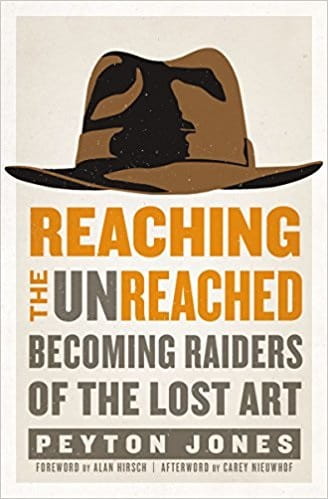Why God is Not in a Hurry

Jesus telling the apostles they would receive power “not many days from now” implies that God isn’t in a hurry to prep us for our journey. He’s not running in panicked circles like the white rabbit, shouting, “I’m late, I’m late!” God is deliberate and measured in the development of his disciples. If he spent three years preparing the twelve, he’s more than willing to take the time to develop you. If he allowed Paul nearly twelve years from the road to Damascus experience to his first missionary journey, he will spend time developing you as well. That’s why Jesus told the disciples, “Not many days from now . . .” Why not right then? Why not that day? Why not immediately as he was still standing in front of them? As a results-oriented society, we tend to value arriving at the destination rather than valuing the journey. Yet Jesus put great stock in the journey itself, tacking an additional forty days post-resurrection onto the already three-year pre-mission prep period. If that weren’t enough, Jesus gave them ten additional days to stew a bit longer before the power came. Ask the apostles what that ten-day period of prayer and fasting added to their development. It equipped the apostles with a deeply rooted dependency upon the power of the Spirit of God, mirroring Jesus’ forty days in the wilder- ness in reliance upon his Father.
Ask Paul what perspective God forged in his soul during the eleven preparatory years between the Damascus road and his debut in Antioch. Those eleven years of pent-up frustration from an unfulfilled mandate from the Risen Lord on Damascus Road made Paul like a bull out of the gates when he was finally let loose on his mission. “Not many days from now” reveals that God is equally concerned with the spiritual development of those who are sent, as he is with those he sends them to. We can all be on a journey of preparation with the God of the living. Isn’t that a major component of the gospels—Jesus revealing himself to the twelve along the way? We expect to jump in feet first, reaching the unreached, but what if the Holy Spirit wants you to experience a transformation in transit?
In hindsight, he led me on a slow journey because that was all I could handle . . . at first. If you’ll permit me, I’d like to share my story with you to demonstrate that God didn’t throw me into the deep end, but was patient with me, and developed me as patiently as he did the twelve. In the opening to Indiana Jones and the Last Crusade, we see Indy’s journey to becoming who he was, when he was just a lad on a train. He encounters everything from his first scar to obtaining the fedora, his first artifact, and his fear of snakes. You don’t become a temple raider overnight.
I can best describe my reluctant journey from Princeton professor to whip-cracking adventurer if you’ll permit me to depart from temple-raiding Indiana Jones for a little bit while I turn to a dragon burglaring hobbit. Like the Tolkien stories, it started off slow, and ramped up from there, because I wouldn’t be any more thrilled than Bilbo Baggins about Gandalf knocking on my door asking me on an adventure. Tolkien tells us, “This is a story of how a Baggins had an adventure, and found himself doing and saying things altogether unexpected. He may have lost the neighbors’ respect, but he gained— well, you will see whether he gained anything in the end.” Reluctant adventurers aren’t we all.
At the time, I never would have believed you if you’d told me I’d become a serial church planter,1 planting churches in a Starbucks in Europe, running open mic nights in a gay coffee house in Los Angeles, or baptizing Mexican gangsters next to a member of the Aryan brotherhood in Long Beach harbor. I wasn’t that guy. You’re probably not that person either. That’s why I’ve written this book.
When Gandalf raps on Bilbo’s door declaring that he’s looking for an adventurer, Bilbo quickly dismisses himself as plain quiet folk with “no use for adventures. Make you late for dinner! I can’t see what anybody sees in them.” Gandalf had the reputation of being a troublemaker, who upset the sleepy peacefulness of the shire, responsible for shipping lads and lasses off to the misty mountains on adventures. This is my version of “There and back again,” and maybe this book will get the same reputation, upsetting your cozy hobbit hole existence in ministry. Perhaps you’re a spiritual dwarf, longing for the kingdom that’s rightfully yours, to seek it back from the dragon greedily hoarding everything within the church walls. Perhaps you’re hearing the dwarf song of the misty mountains and something is awakening within you. As Bilbo listened to the stirring music of the past, sung by dwarves around his table, a wish “to go and see the great mountains, and hear the pine trees and waterfalls, and explore the caves, and wear a sword instead of a walking-stick” swept over him . . . longing for adventure.
But Bilbo wasn’t ready. Nobody ever is. Not even the Twelve. Yet what facilitated Bilbo’s transformation was the journey itself. Gandalf calls Bilbo an accomplished burglar before he was one. When child- less Abram’s name meant Father, God called him Abraham (Father of nations). Jesus called Simon “The rock,” despite Peter’s crumbling under a little girl’s probing questions around a campfire. Who but this same God would call Gideon “Mighty Warrior” as he hid crouching at the bottom of a winepress in fear of his life? God delights to call “those things that do not exist as though they did” (Rom. 4:17 nkjv). We forget that God delights in transforming people. But what facilitates the transformation is the willingness to embark with him on the journey he set out for you. Because the journey is one of faith, God reveals himself, transforming us forever. Jesus promised to transform the disciples, “Follow me, and I will send you out to fish for people” (Matt. 4:19). But there was a condition attached. The necessary condition of following him first, “follow me,” precedes the promise of what he will bring into existence, “fishers of men.” Because it’s a conditional invitation, if we don’t accompany him on this journey, like Bilbo, we won’t be changed. We won’t become burglars, raiders of a lost art.
What about you? Has God started to take you on a journey to places you haven’t wanted to go? A place where there’s no read-along- storybook guide? No magical chimes telling you it’s time to turn the page? No guarantee that there’s not a scary monster at the end of the book? That’s called risk, and it’s what makes an adventure worth living. It was a risky endeavor when Jesus took twelve men and called them to leave the security of their nets. And he’s still in the business of rapping on your door like Gandalf. Don’t worry. He’ll supply the fabulous fireworks and dreaded dragons.
Besides, Bilbo didn’t gain any confidence until he encountered danger and overcame his fears in the form of three stone trolls. What is it you fear most?
1. I prefer the term Ninja Planter. For the reason why, see www.peytonjones.ninja

Peyton Jones has been on the front lines of ministry for over ten years. In 1999, at the age of 25, he moved to Europe, and served as the evangelist at Lloyd-Jones’s legendary Sandfields church, Aberavon. An accidental church planter, Jones planted in a Starbucks before returning to America, and planting in inner city Long Beach. To reach those nobody is reaching, Jones has worked as a firefighter, factory worker, barista, and psychiatric nurse, bringing all these experiences to the table. Jones received his MA Theology: Pastoral Studies from Wales Evangelical School of Theology, and is the Regional Catalyst for NAMB. He is also the host of the Jump School Core Team Training Series, Managing Editor of Church Planter Magazine and the co-host of the weekly Church Planter Podcast.
Image courtesy: ©Thinkstock/Everste
Publication date: May 16, 2017
Originally published May 16, 2017.







